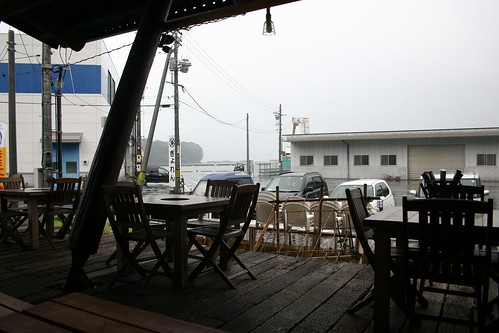Wednesday, August 17, 2005
The Japanese are Ambivalent towards Nature
I uploaded this one to illustrate how little the Japanese are into Nature. I know that they worship it but a lot of the time they avoid it or make no effort to experience it.
This is shot from a restaurant of a popular seafood market and mall in Hagi, Yamaguchi. It is called something like "sea market" and it sells all the fruit of the sea (please view my other photos). But for some reason they built the mall/market about 50 yards from the sea, seperated by a warehouse. One can only just see the sea from a gap in the car park. Why didn't they build it on the waterfront so that one could look out accross the choppy sea of Japan while scoffying salmon? Because no one wants to look at the sea. Not even on a nice day. Why is this?
1) The Japanese value convenience more than anything else, and it is more convenient to have the warehouse next to the water's edge, than it is to have a restaurant next to the water's edge.
2) To the Japanese, nature is associated with disaster so they prefer to keep a respectful distance from things thave such awesome power. Indeed, Japanese nature is more inclined to cause both suffering and happiness due to the relative prevalence of earthquakes, tidal waves and hurricanes. Perhaps the positioning of this restaurant is a wise precautionary measure.
3) The Japanese feel themselves to be much more at one with nature as demostnrated by their ability to get their kit off and bathe in the nude with other people, or smell and enjoy their own faeces, or sell and purchase sex services in a manner that would be unacceptable in the UK. Being so much closer to nature the Japanese do not feel the urge to reinforce their link to it. It is rather Westerners that are so used to ignoring or dominating nature that they feel the urge to get on down in amongst it, occasionally, in their spare time.
4) As argued by Rene GIrard or is accessible from psycholanalytic theory, and is apparent from the way that spirit embodiments are hidded and wrapped in Shinto shrines, the sacred is very often taboo. Perhaps the Japanese have an ambivalent unconscious attitude towards nature that encourages them to keep a safe distance. This notion that the negative feelings towards nature are unconscious, and that Japanese people are not even aware of their ambivalence towards nature is born out by the way in which Japanese generally protest that they like nature, and do not seem to realise the lack of restaurants by the sea, or bars by rivers, or places to swim in rivers, or beaches, or paths to the tops of mountains.
5) Japanese women rule Japan and women are generally less interested in nature in both the UK and Japan. If Japanese men were in charge of where restaurants were positioned then they would be positioned on the water's edge as they are in Hawaii or other locations where there are attractive areas of water.
This photo has notes.
Labels: japan, japanese culture, nihonbunka, 日本文化
This blog represents the opinions of the author, Timothy Takemoto, and not the opinions of his employer.

